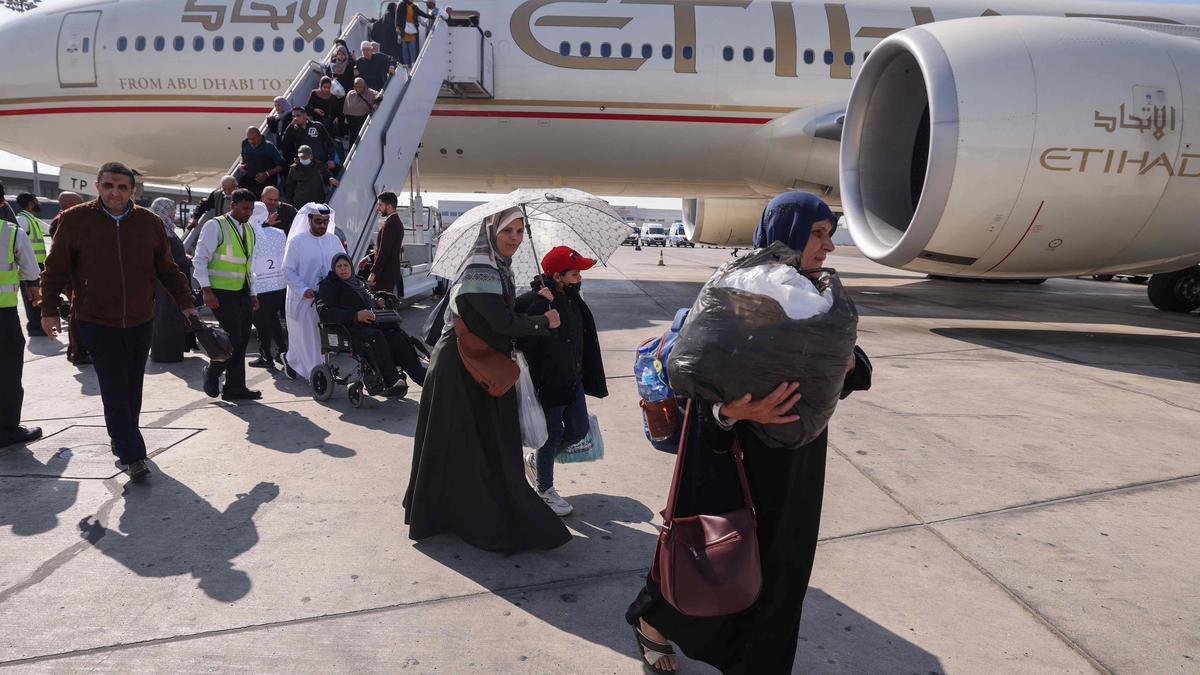
Fraternal ties and humanitarian gestures go hand in hand for the UAE in support of Gaza Premium
The Hindu
She is a former editor of a business magazine and a former senior correspondent with a leading Indian daily)UAE's Sheikh Mohammed bin Zayed al Nahyan has opened humanitarian corridors, airlifting 1,000 injured Gazan children and 1,000 cancer patients, and pledging funds of US$ 20 million. He also ordered the establishment of an integrated field hospital and three desalination plants in Gaza. The UAE, along with other Arab nations, has been vocal about the rights of civilians in the war zone, and has condemned the Hamas attack. It has also appealed to the international community to revive the peace process and resolve the Israeli-Palestinian conflict.
The war-weary world, especially the Arabian Peninsula, can heave a sigh of relief that Israel and Gaza-based militant group Hamas have reached a six-day truce for the exchange of detainees as well as delivery of relief aid and humanitarian assistance for Gazans, who have borne the brunt of an Israeli onslaught since the October 7 Hamas attack that reportedly killed 1200 Israelis and abducted another 240.
The directives of Sheikh Mohammed bin Zayed al Nahyan, UAE President and Ruler of Abu Dhabi, to airlift 1,000 injured Gazan children and 1,000 cancer patients and treat them prior to their safe return home has offered a reprieve for Palestinians caught in the quagmire that is the Israel- Hamas conflict.
Ever since Israel began its military retaliation on Hamas in Gaza, the UAE has been vocal about the rights of civilians in the war zone. Apart from persistent pleas to stop the bombardment, the UAE, which established full diplomatic relations with the Jewish nation in September 2020 through the Abraham Accords, made an entreaty in the UN Security Council through its ambassador Lana Nousseibeh. “Access to fuel, food, water, medical aid, and other basic necessities must be fully restored. We must create a framework for rapid, unimpeded, and safe humanitarian access for the brave workers who are risking their lives today on the ground.” She expressed her nation’s disappointment at the vetoing of draft resolutions seeking a respite for Gaza, which has seen the death of over 14,000 Palestinian civilians in Israeli air and ground raids.
The UAE, like other Arab nations in the region, does not intent to upset the applecart that is regional peace and stability, and propel West Asia into a full-fledged war. It has instead opened humanitarian corridors, sending flights of aid through the Egyptian city of Arish and pledging funds to the tune of US$ 20 million. According to Dr Maha Barakat, Assistant Minister of Foreign Affairs for Health, the UAE has dispatched 51 planes carrying 1,400 tonne of food, medical, and relief supplies in coordination with international organisations such as the UN World Food Programme.
Individual brands and companies in the country chipped in with their profits and earnings not to mention young school children, who contributed their savings or cancelled Deepawali celebrations in solidarity with the suffering millions in the Palestinian enclave.
The Tarahum for Gaza (Compassion for Gaza) campaigns in late October saw residents and citizens turn up in large numbers in Dubai, Abu Dhabi and Sharjah to pack relief material as well as make donations in cash and kind for the war victims.
For Indian expatriates Owais Asgar Bade and Ashwin Mathew, university students who took part in the Sharjah drive on October 22, volunteering for the cause was the least they could do for the people of Gaza. “I was driven by a desire to make a tangible impact and support those in need, and it turned out to be a profound experience. It showcased the power of collective efforts in providing essential aid to those going through challenging circumstances,” said Mr. Bade. “In fact, the campaign brought to the venue such large numbers of people that the packing was over much earlier than anticipated,” noted Mr. Mathew who had helped pack groceries.

U.S. President Donald Trump threatens 200% tariff on wine, champagne from France, other EU countries
Trump threatens 200% tariffs on European alcohol in response to EU levies, sparking trade tensions and market uncertainty.












